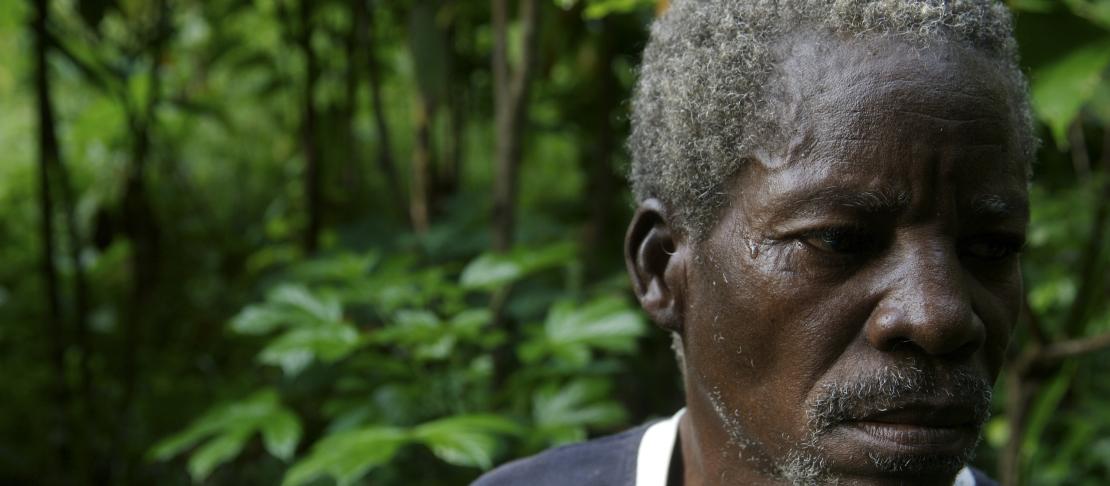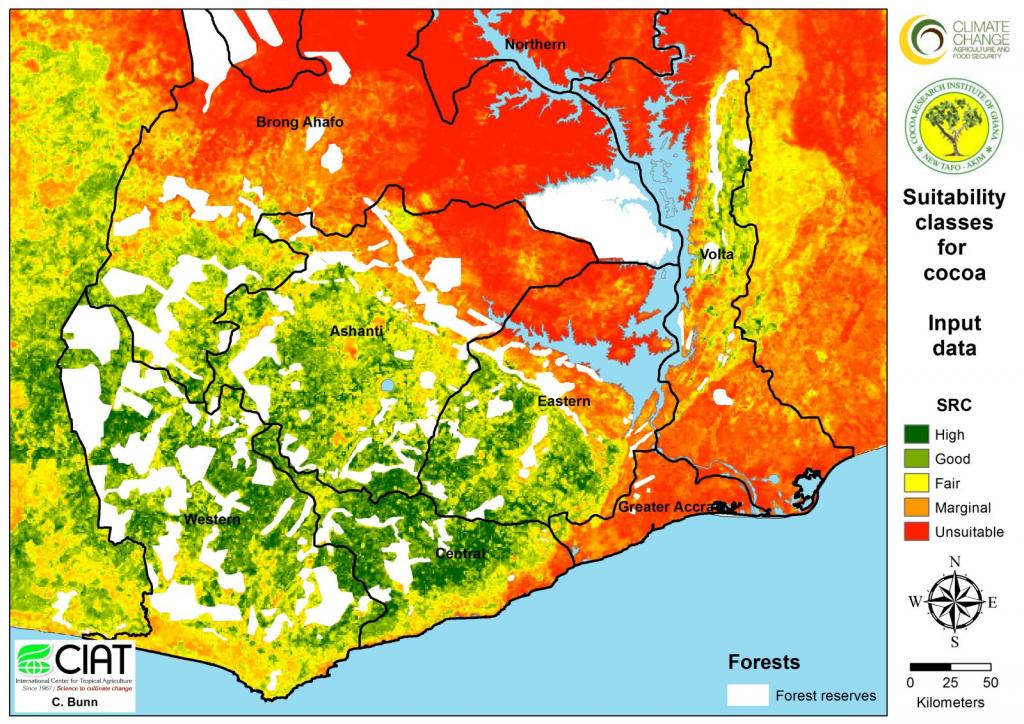Mainstreaming climate-smart practices in cocoa production in Ghana

The adoption of site-specific, climate-smart practices is indispensable for mitigating the projected negative effects of climate change on cocoa production in Ghana.
Responding to this challenge, the CCAFS-supported project 'Mainstreaming CSA practices in cocoa production in Ghana' (2015-2019) assesses the climate change exposure of cocoa systems in Ghana by using a transect approach to identify sites with high, medium, and low climate change impacts. Key actors from the Ghanaian cocoa sector are involved in developing locally relevant adaptation strategies, such as the adoption of climate-smart agriculture (CSA), through participation in multi-stakeholder platforms.
The project brings together preeminent actors in agricultural climate science (the International Center for Tropical Agriculture (CIAT) and the International Institute of Tropical Agriculture (IITA)), voluntary certification (Rainforest Alliance), impact investing (Root Capital) and sustainable agriculture systems (the Sustainable Food Lab) to achieve the expected outcomes.
By building on existing knowledge and adaptation practices in place, the project seeks to add value to ongoing activities. As such, the role of the multi-stakeholder platforms is to ensure that sector needs are met by project outputs, thereby contributing to the desired outcome of all participants: a competitive and climate-smart Ghanaian cocoa sector.
Multi-stakeholder platforms as knowledge incubators
The kick-off workshop, held in Accra in May 2015, was attended by over 70 participants representing government, private sector, civil society, research institutions and donors. After an introduction to the project and the presentation of preliminary results on mapping climate change impact zones in Ghana, participatory exercises revealed knowledge gaps on the consequences of climate change for cocoa in Ghana, and highlighted demand for actionable tools on climate change adaptation among value chain actors.
Based on discussions during the first multi-stakeholder platform, advances were made in mapping the current and future distribution of agro-ecological zones of cocoa production in Ghana, and in exploring to what extent these different zones will be affected by climate change. In particular, more attention was given to the role of soils, the development of clearer climate indicator variables and the inclusion of protected areas. An important outcome of this elaborated research in collaboration with the Cocoa Research Institute of Ghana (CRIG) is that soils are a determinant factor in resilience against climate change in Ghana. To give Ghanaian cocoa production a future, site-specific adaptation practices that prevent soil erosion and enhance soil stewardship need to be developed for the different impact zones.

Soil suitability map for Ghana for cocoa production. Dark green indicates soils with high ability to provide resilience against climate hazards. Red soils are unfit for cocoa cultivation. White patches represent protected areas. Image: Christian Bunn (CIAT)
In March 2016, the multi-stakeholder platform on cocoa in Ghana reassembled in Accra to review the information gathered during the past year. The advances in mapping climate change impacts on different production zones were presented and discussed. The sharing of additional information from farmer consultations, desk study, field assessments, expert interviews and a stakeholder workshop on adequate climate-smart practices for each of the climatic impact zones led to strong opportunities for common learning. Furthermore, partners interested in promoting CSA practices in specific zones were identified, and a sneak preview of a new 10-year policy for climate-smart cocoa in Ghana was presented.
Yaw Kwakye of the Forestry Commission of Ghana on developing the policy:
The CCAFS initiative brings a lot of value to the work we are doing. They have shared with us the maps and we will make sure that the interesting outcomes are well-articulated in the document we are developing.
Outlook for adaptation in the cocoa valua chain
Over the next years, the project will collaborate with its partners to develop, test and implement relevant climate change adaptation practices per impact zone as explored during the multi-stakeholder platforms. Another focus will be on identifying the needs of the private sector to make the business case for climate-smart practices at various levels of the cocoa value chain in Ghana.
The project is part of a larger CCAFS work currently active in Ghana, Nicaragua and Peru that aims to enable key public, private and civil society actors to interpret projected exposure to climate change by cropping system and region into site-specific CSA practices and to incorporate these practices into their work with farmers.
Read more
- Story map: Bittersweet chocolate: The climate change impacts on cocoa production in Ghana
- Article in NewsGhana: Building Climate Smart Value Chain In Cocoa Sector
- CCAFS blog: Climate-smart value chains in smallholder agriculture: getting started
Irene van Loosen is Consultant, Linking Farmers to Markets, International Center for Tropical Agriculture (CIAT).



